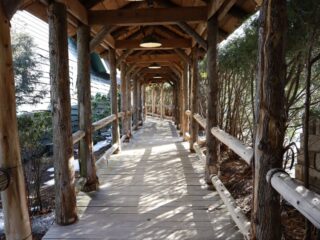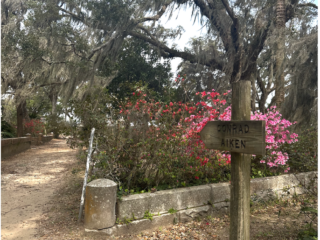by James L. Secor
Despite the nouveau rich careening madly around town in their upscale imported cars and SUVs, Shaoxing, China still retains much of its slow, gentle character. The women, especially, are known for their beauty and gentleness. The people are congenial. It is a good place to live and write.
Twenty minutes by foot from my apartment is Lu Xun’s Native Place, as it is called, an old street along one of the remaining canals in Shaoxing City, Shaoxing County, Zhejiang Province. Just south of Hangzhou, the provincial capital and ancient capital of the Southern Song Dynasty (Marco Polo was here), Shaoxing is part of a rich merchant and cultural corridor known as Jiangnan, which includes Shanghai and Wuhan. But the area is best known for its creative geniuses, perhaps the most famous being Zhou Zhangshou, Lu Xun.
When he lived here, it was still the Venice of the East, laced with fresh water canals and surrounded by rivers. Now, in the name of modernization, it has been all but paved over. Some of the ancient canals and their bridges are still here, the bedroom slipper-looking boats (wu peng chuan) for hire by tourists. Pedal taxis, looking for all the world like rickshaws, ply the streets, both modern and historical lanes. I love traversing the old streets. I feel more at home there. The life is more human. Most of these old streets, still with their ancient paving stones, are too narrow for cars. There is a flavor here of neighborliness and a lost humanity. Lu Xun’s stories show a decided lack of humanity in their satire of the social upheavals of the times.
Lu Xun’s Native Place is on a section of preserved old main road. It is built up with shops, tea houses and restaurants – and, of course, tourist traps – in the historical style of wood beams and plaster walls still evident in much of the city. But 12 to 15 years ago, this road was populated only by the Zhou family house and a private primary school. Admission to the house and museums is frightfully expensive. Lu Xun had, in the mid-1920’s, sold the property while in Beijing, and moved his family there where he taught at three universities and maintained a position at the Ministry of Education. He lived in Beijing fourteen years. His youth – and a few years after his medical studies in Japan – were spent in Shaoxing; the great bulk of his life, he lived in Shanghai. He is still Shaoxing’s own.
When Lu Xun returned from Japan, having given up his medical studies for literature, he translated in Hangzhou and taught at Zhejiang Normal College where he managed to get the president, a Confucian moralist, fired. He quit upon learning a government official would fill the vacant slot and then went to teach in a middle school in Shaoxing. He was offered a post at Shaoxing Normal Academy, a three-year institute, but turned it down. A year later, when there was a bit more desperation in the school’s need, Lu Xun accepted the position of headmaster.
He encouraged, in his revolutionary zeal, the students to cut off their queues, symbol of Qing Dynasty oppression. His cynical story “The Queue” is drawn from his year at the academy. He also supported the students in their establishment of a newspaper criticizing the politicos of the day. This was to create problems and lead to his exit to Nanjing. Today, the Shaoxing Normal Academy is Shaoxing wenli xueyuan, Shaoxing College of Arts and Sciences. I teach British and American literature here today. Lu Xun taught Chinese literature and biology and encouraged his students to study art.
On his return from Japan, his mother had found a wife for him, Zhu An, but they were not fit for each other; the marriage was never consummated. After a time, Lu Xun, with his brother, simply walked off, as the story goes. He never divorced Zhu An. Later, in Beijing, he fell in love with one of his students and they lived in common law after moving to Shanghai; the children from this union were accepted into the family. By today’s standards, Lu Xun was a bigamist. Zhu An lived out her days at Lu Xun’s mother’s house in Beijing, as would be expected of a wife, spurned or otherwise.
Lu Xun’s outspoken attitude toward the Republican government (Guomindang) forced them to remove him from Shaoxing to Nanjing, the capital. Apparently, he did not have a peaceful, pleasant time in his hometown during 1910-12, as can be surmised from the flap in the city government over his support for the student-run newspaper. After a year of doing nothing in Nanjing, as he said, he moved to Beijing and thence to Xiamen. From Xiamen University, he went to Guangzhou to become Dean of Chinese Literature at Zhongshan daxue (Sun Yat-sen University) – for five months.
He got into trouble with the right wing Guomindang (Kuomintang) government’s repressive tactics, attempting to free student protesters from jail. He ended up in Shanghai, where, at the ripe old age of 47, he retired from academia. The political correctness of Sun Yat-Sen University remains to this day: I taught literature and drama there for a year. Unrest swirled around me as well as I worked on an all-female production of Lysistrata.
Lu Xun’s work and life has been cleansed to make him fit in with the new political order. His work is held in high esteem, as it was during his life-time, but it has been made oblique and all but incomprehensible. Students don’t like reading Lu Xun; they are inundated with his writing from elementary school on in the form of slogans and propaganda. His writing is labeled as being purely imaginary with no tie to reality, as if a man didn’t live and experience: there can be no imagination without life. Yet, biographers will attempt to paint a picture of him from his writings. This is a misinterpretation of literature, it is seeing literature as a discursive medium whereas it is a symbolic medium. However, from his essays, letters and reminiscences and prose poems, one can glean a view of him and his life . . . and often see a connection in his story telling.
It is said, for instance, that there is a discrepancy between his writing and his life. His stories are cynical and sarcastic and do not give a very positive view of life; yet, he was well-liked as a teacher and held in high esteem. I do not see how the two are connected: his literary satires and other people’s opinions of him. Most people are unaware of my depressions, I hide them well; my students believe I am always smiling and full of life. I have two lives. Both Lu Xun and I write satires. Satires are literary comments upon the paradoxes, contradictions and silly foibles a writer sees in society. Satires indicate, at the most, that the writer lived in two worlds simultaneously.
Lu Xun was an activist, against all forms of injustice by both political parties; he was a humanist because he fought for people’s lives and liberty. If he’d been a pessimist or had a sour outlook on life, he’d not have bothered to pen satires, stories laced with hope, for if people can see the ridiculousness of their situation, they might change for the better. He’d not have put himself in harm’s way to save people’s lives in pursuit of righting injustice if he were a sour man. Lu Xun’s reminiscences, however much they reveal about him, lack the vitality of his literary works. Reminiscences are ever conditioned by the times they were written, often coloring the memories; the difficult times are difficult to get excited about.
The present government has shaped Lu Xun’s biography to show his gradual awakening to and acceptance of Marxism. Lu Xun died in 1936 at a time when Communism had been swept out of southern China. At best, it was an underground movement, as Communism was made illegal. Mao and his cohorts had been driven north. Lu Xun never joined the Party. But the modern historians still say he began to have Communist sympathies. Mao did visit him and his brother in Beijing, a time when the north was ruled by war lords. Disaffection over the Guomindang does not equate to a pro-Communist stance. The True Story of Ah Qmight be a fictional representation of this dualistic thinking.
All biographies maintain that Lu Xun’s time in Beijing was a time of depression, at least the last two years of it (1924-26) when he was publishing and editing. Although it is true he did not produce the number of stories or other writings he would later produce, no depressive would have had the energy to hold three posts at three universities and work at the Ministry of Education (however nominal the post). No depressive would also have managed, during the same period of time, to help renovate the Capital Library, set up the National History Museum and establish the Library of Popular Literature. He also published with the Beijing ribaoand established the Weiming Society supporting young writers.
I have not been nearly so active, but I seem to be following in Lu Xun’s footsteps, for I, too, gave up premedical studies for art (theatre and writing). I sojourned in Japan, for five years. I returned home (US) and became involved in activism, got into trouble and came to China for a job. I am not, however, a translator or known literary scholar; nor am I a famous writer – but I dowrite satire. Both of us, too, seem to follow in the footsteps of Mark Twain, who championed the ability of not being able to hold a job for any length of time and a penchant for getting into trouble.
Will Shaoxing, where I live in two worlds – one of history and humanity, and the other of crass materialism, the insatiable hunger for financial gain, and dehumanization – give impetus to my career, like that of Lu Xun’s?
Jim Secor is a wandering scholar and writer who has lived in China for six years. He writes for www.mwcnews.net and, when fortune is with him, for www.counterpunch.com. He writes a column within a column authored by his friend, the poet Ma Li, in Guangzhou. Translations of his tanka poetry are awaiting a home. He can be reached at znzfqlxskj@gmail.com. These are the initials of his adopted daughters (Chinese) and his own Chinese name. He is currently looking for fame and a wife, though not necessarily in that order.








